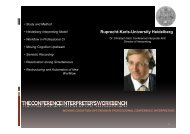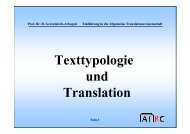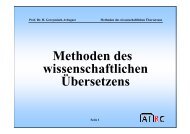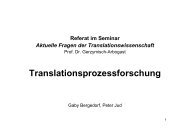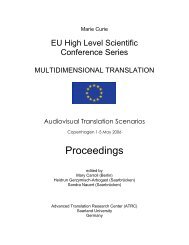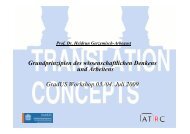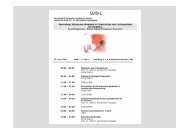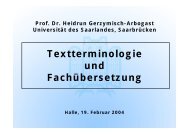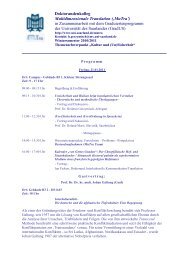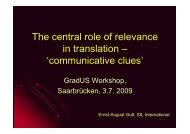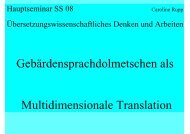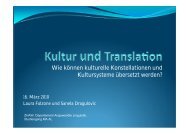Proceedings - Translation Concepts
Proceedings - Translation Concepts
Proceedings - Translation Concepts
You also want an ePaper? Increase the reach of your titles
YUMPU automatically turns print PDFs into web optimized ePapers that Google loves.
MuTra 2005 – Challenges of Multidimensional <strong>Translation</strong>: Conference <strong>Proceedings</strong><br />
Gertrud Hofer<br />
interpreters to a increasing degree although at present there are no data on the exact number of<br />
interpreted interrogations, legal examinations or trials.<br />
2 Court Interpreting in Switzerland<br />
Only very seldom do professional conference interpreters choose to work for federal or<br />
cantonal authorities or the criminal courts 2 because of the low salaries and the comparatively<br />
poor working conditions (e.g. lack of access to records). Although court interpreting has<br />
gained importance throughout Europe in the past few decades and courts and other public<br />
authorities have to rely on interpreting services for numerous languages, there have been few<br />
formal training programs up to now. The educational background of court interpreters varies<br />
from doctoral degrees to very limited education and correspondingly few can learn to interpret<br />
professionally on their own. Thus heterogeneity is one of the most difficult aspects for the<br />
authorities and the courts (and of course also for educational institutes).<br />
Irrespective of the various levels of interpreting quality, there are regulations<br />
stipulating the involvement of court interpreters. The most important of these in Switzerland,<br />
established in the federal constitution (Art. 29), are binding for cantonal courts and judges and<br />
guarantee the right to a fair trial, meaning that no one should suffer discrimination because of<br />
language. Furthermore, every individual in Switzerland has the right to receive equal and fair<br />
treatment by legal and administrative authorities (Art. 1), and contesting parties have the right<br />
to a legal hearing (Art. 2). At the European level, the Convention for the Protection of Human<br />
Rights and Fundamental Freedoms (Art. 5, para. 2 EMRK) establishes correspondingly strict<br />
rules: Everyone who is arrested shall be informed promptly, in a Language which he<br />
understands of the Reason for his Arrest and of any Charges against him. Switzerland has<br />
consistently implement the Convention for the Protection of Human Rights and Fundamental<br />
Freedoms since joining the Convention in the year 1974.<br />
Utmost diligence, correctness and completeness are indispensable in legal proceedings<br />
when acquittal or sentencing is at stake. Unprofessional interpreting or translating can<br />
therefore have serious consequences for the language mediator involved. The Swiss Criminal<br />
Code (Art. 307, para. 1) stipulates that translators and interpreters can be charged and<br />
sentenced to up to five years for misrepresentation or mistranslation.<br />
According to information from the Supreme Court of the Canton of Zurich, an<br />
interpreter has to be present in approximately 50% of all criminal justice cases and the<br />
number is on the increase (personal communication). The languages concerned have changed<br />
with subsequent waves of migration: in the 1960s Italian, Spanish, and Portuguese became<br />
increasingly common in Switzerland whereas in the 1970s Arabic and Turkish were the new<br />
languages. In the 1980s the use of Lebanese, Latin American Spanish, and African languages<br />
increased, and since the 1990s the languages from Eastern Europe have become more<br />
frequent (as shown in Figure 1). Not surprisingly, the courts in the Canton of Zurich have<br />
experienced an increase in the number of interpreters and languages covered: as of 2005, 130<br />
different languages are listed, covered by over 962 interpreters (Table 1). In 2003, there had<br />
only been 560 interpreters.<br />
2 In civil proceedings, the contesting parties often do engage professional conference interpreters.<br />
163



